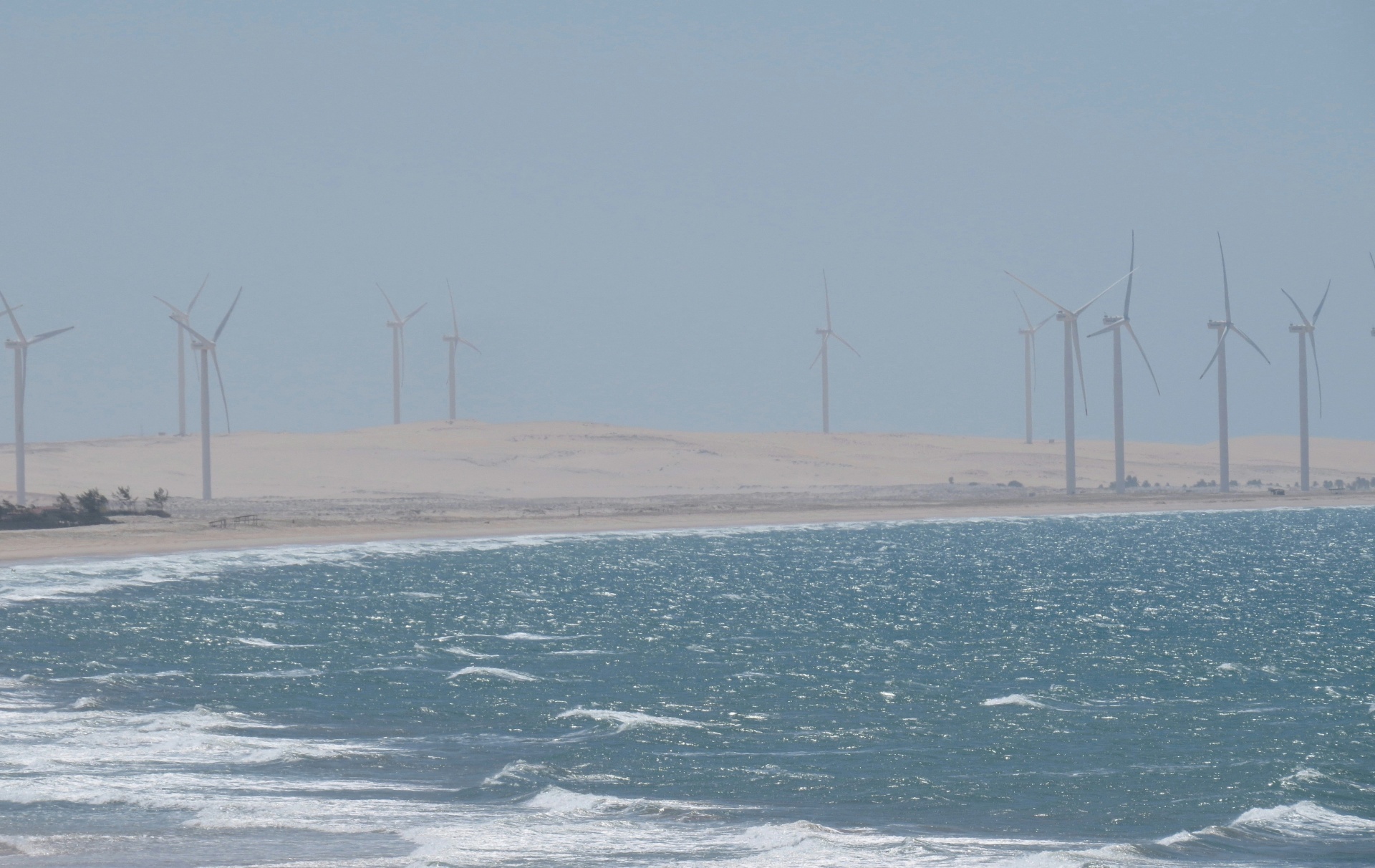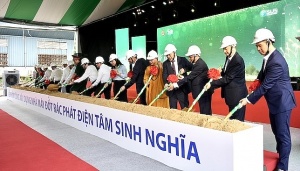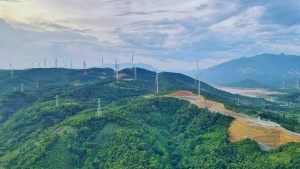MoIT report addresses offshore wind project concerns
 |
The current plan also lacks details on the number, capacity, and locations of offshore wind projects, as well as schemes to connect these sources to the national grid.
This is according to a Ministry of Industry and Trade (MoIT) report submitted to the government on a pilot study for offshore wind power development on July 22.
The MoIT has proposed that state-owned enterprises such as Vietnam Oil and Gas Group (PetroVietnam), Vietnam Electricity (EVN), or entities under the Ministry of Defence (MoD) should pilot offshore wind power projects instead of private companies.
In its report, the MoIT outlined three options for selecting investors to pilot offshore wind projects. The first option is to have PetroVietnam undertake the pilot investment. The Ministry argued that certain aspects of offshore wind projects are similar to offshore oil and gas projects, giving PetroVietnam an advantage due to its existing database and resources in the oil and gas sector.
"PetroVietnam's experience in offshore operations can significantly benefit the implementation of these wind projects," the MoIT report noted.
Some industry experts believe that the involvement of oil and gas corporations is crucial for rapidly establishing offshore wind as a significant industry. The International Energy Agency reports that the expertise of the oil and gas industry can account for 40-45 per cent of the costs of an offshore wind project.
Major global players in this field include Equinor, Shell, Repsol, Total, BP, and Chevron. In Southeast Asia, Malaysia's national oil company Petronas has established the renewable energy company Gentari and acquired a 29.4 per cent stake in the Hai Long offshore wind project in Taiwan.
However, assigning PetroVietnam to invest in offshore wind requires assessing and adjusting the company's business scope and strategy, as PetroVietnam is currently not permitted to invest outside its core activities. Moreover, the group would need to adapt to the specific demands of the offshore renewable energy sector.
The second option is to assign EVN to undertake the pilot projects. The MoIT noted that EVN has certain advantages, such as experience and capability in investing, managing, and operating power plants and transmission systems. Additionally, it would not need to negotiate prices, as it is both the buyer and seller of electricity.
"EVN's integrated role in the power market can streamline project implementation," the ministry stated. However, the regulatory body expressed concerns that offshore wind involves different requirements compared to traditional power projects.
The third option proposed by the report is to assign a unit under the MoD to pilot the offshore wind projects. This option would need to be evaluated for feasibility and alignment with the ministry’s objectives after assessing the specific capabilities of the defence units.
The MoIT acknowledges that there is currently insufficient data to evaluate the effectiveness of assigning PetroVietnam, EVN, or the MoD to pilot offshore wind development. Offshore wind is a new field involving national defence, security, and maritime sovereignty.
Additionally, since no offshore wind projects have been implemented yet, the regulatory body lacks experience. Potential conflicts between different sectors over the use of marine space and challenges stemming from legal and technical issues related to the projects are also concerns.
The proposed options will be further clarified as the relevant ministries and sectors provide their input.
The MoIT also revealed that private and foreign investors have not been assigned to pilot offshore wind projects due to unresolved defence, security, and electricity pricing issues.
Despite several foreign investors showing interest in Vietnam's offshore wind sector, the ministry remains cautious. Danish firm CIP plans to develop the 3.5GW La Gan offshore wind project in the central province of Binh Thuan, while German company PNE aims to undertake a $4.6 billion project in the central province of Binh Dinh.
In 2022, 36 domestic investors sought permits to survey offshore wind potential, but the Ministry of Natural Resources and Environment recommended a halt due to legal constraints.
The MoIT acknowledged that private investors have been active in the energy sector, primarily in traditional power and small-scale solar and wind projects. However, the ministry believes it is premature to assign private entities to pilot offshore wind projects without a comprehensive assessment of the challenges and legal issues involved.
"Foreign and private investors will be considered for offshore wind projects once a thorough evaluation of pilot projects is completed and the legal framework is refined," the ministry stated.
Previously, Prime Minister Pham Minh Chinh and Deputy Prime Minister Tran Hong Ha instructed the MoIT and other relevant ministries to research and develop pilot offshore wind projects.
To establish a legal basis, the ministry suggested that the National Assembly should pass a resolution permitting these pilot projects. However, experts cited by the ministry estimate that developing an offshore wind project takes approximately 6–8 years from the initial survey stage. Therefore, even if the National Assembly passes the resolution this year, achieving the 2030 target of 6,000MW of offshore wind capacity remains challenging.
"This is a significant issue, and we recommend reporting to the relevant authorities before the government decides to propose a pilot offshore wind development resolution to the National Assembly," the MoIT report concluded.
Vietnam is aiming for an offshore wind power capacity of 6,000MW by 2030, with a target of 70,000-91,500MW by 2050.
 | Construction begins at BCG's waste-to-energy plant A groundbreaking ceremony was held on July 20 for a new waste-to-energy plant in Cu Chi district, Ho Chi Minh City. |
 | DPPA approval a win for clean energy The US Department of State’s Bureau of Energy Resources (ENR) applauded the Vietnamese government's approval of a direct power purchase agreement (DPPA) on July 3, a significant milestone towards achieving net-zero emissions by 2050. |
What the stars mean:
★ Poor ★ ★ Promising ★★★ Good ★★★★ Very good ★★★★★ Exceptional
Related Contents
Latest News
More News
- Trung Nam-Sideros River consortium wins bid for LNG venture (January 30, 2026 | 11:16)
- Vietnam moves towards market-based fuel management with E10 rollout (January 30, 2026 | 11:10)
- Envision Energy, REE Group partner on 128MW wind projects (January 30, 2026 | 10:58)
- Vingroup consults on carbon credits for electric vehicle charging network (January 28, 2026 | 11:04)
- Bac Ai Pumped Storage Hydropower Plant to enter peak construction phase (January 27, 2026 | 08:00)
- ASEAN could scale up sustainable aviation fuel by 2050 (January 24, 2026 | 10:19)
- 64,000 hectares of sea allocated for offshore wind surveys (January 22, 2026 | 20:23)
- EVN secures financing for Quang Trach II LNG power plant (January 17, 2026 | 15:55)
- PC1 teams up with DENZAI on regional wind projects (January 16, 2026 | 21:18)
- Innovation and ESG practices drive green transition in the digital era (January 16, 2026 | 16:51)

 Tag:
Tag:


















 Mobile Version
Mobile Version